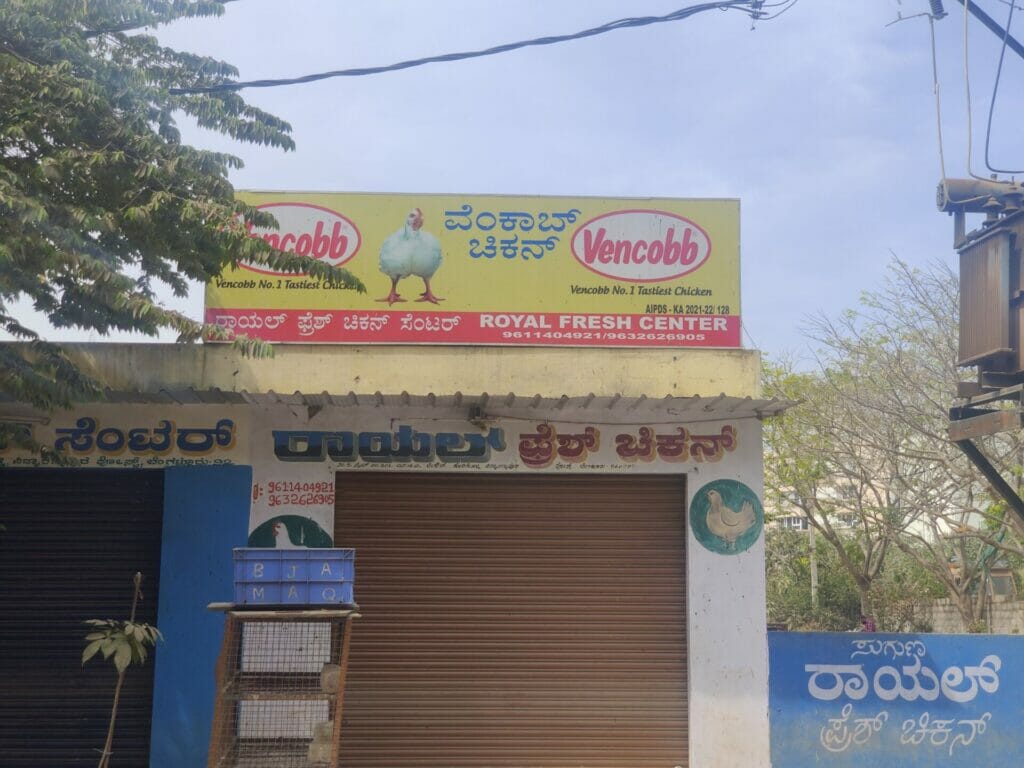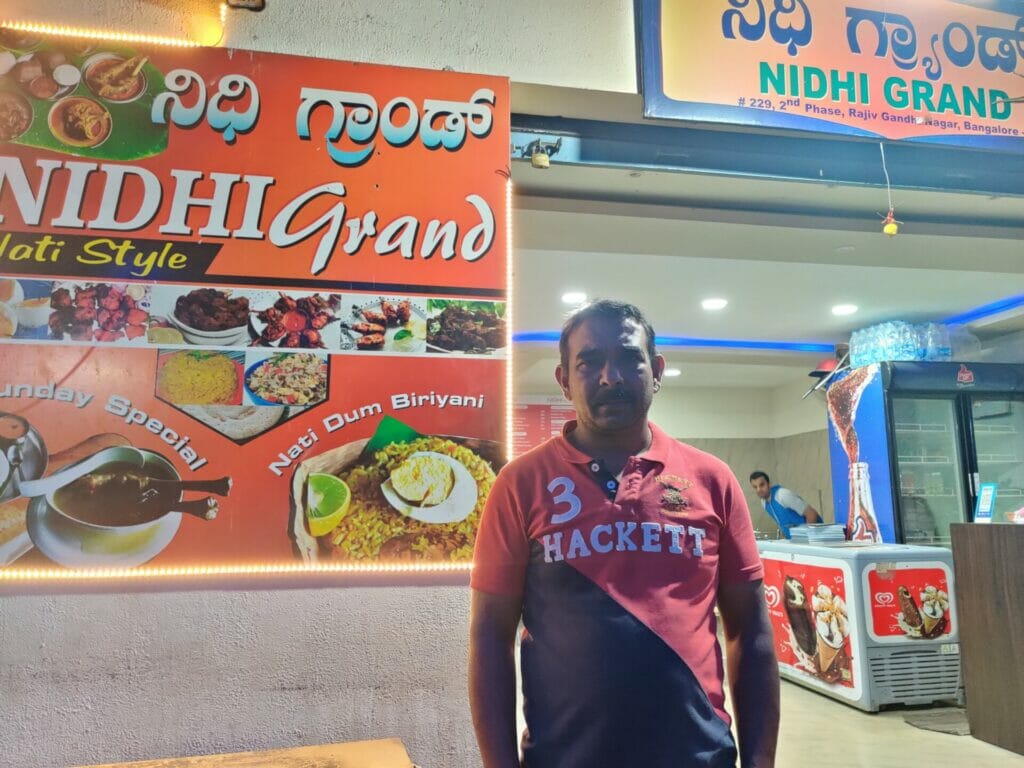In the run up to the biennial Aero India show, BBMP has issued an order banning the slaughter or sale of meat within ten kilometres of the Yelahanka Airforce Station. This year the air show and aviation expo is scheduled to be held from February 13th to February 17th and meat shops have been asked to shut shop and restaurants and eateries have been asked to desist serving meat for 20 days, starting from January 30th till February 20th. The order is issued on the basis of the BBMP Act 2020 and Indian Aircraft Rules 1937 rule 91.
This long running practice may improve air safety, but is leading to financial losses to small businesses and low income communities in the area.

Reasons for the order
Aircrafts, particularly the light aircrafts that display in the air show, are vulnerable to being struck by scavenging birds. “If planes, which move at very high speed, collide with birds, aircrafts can be substantially damaged and pilots can be injured,” explains Dr Lakshminarayan Swamy, Assistant Director, for Animal Husbandry at the BBMP Yelahanka zone.
These accidents are largely caused by large carnivorous scavenging birds like Black and Brahminy Kites. “These species are especially attracted to meat, particularly raw meat and animal waste. So, we ask meat shops to shut down. When no food source is available, the birds go to other parts of the city,” he says.
Similar orders are issued by the health department to restaurants serving meat, while BBMP engineers in charge of lakes also stop fishing during this period, and the solid waste management department organises special cleaning drives to keep it free of garbage, according to Lakshminarayan.

Meat shops and businesses impacted
The flipside of these orders is that meat shops and food businesses serving meat in the area are unable to eke out a livelihood for 20 days. While eateries can operate and serve vegetarian food, meat shops and butcher shops have to completely shut down.
“When the order comes, there is nothing else for us to do but shut shop,” says Manjunath, who runs a chicken shop in Kodigehalli. “We got a circular from BBMP and if we don’t follow the order we could be fined,” he adds.
Read more: For paanwalas of Bengaluru, bribes and eviction threats a constant reality
Some eateries are making do with only serving vegetarian food, but restaurants that specialise in meat are suffering greatly. N Lokesh, proprietor of a restaurant in Rajiv Gandhi Layout, served his last piece of chicken on January 30th and bid goodbye to his regulars.
Although his restaurant also has vegetarian food, Lokesh is pulling down shutters for 20 days. “My speciality is naati [country style] food. Our top selling dishes are mutton. Nobody will come if I sell vegetarian food,” he says. “It is better to shut down and save a little on electricity.”

At a locally popular fried chicken outlet, Prasad, a worker, has been told by his employer to keep the shop open and do his best. “We can’t sell fried chicken,” he says. “But the owner is asking me to try and ramp up sales of the vegetarian products, like aloo [potato] patties and veg burger. Who will buy this in a fried chicken shop?” he asks, laughing.
These closures and reduced sales cause significant financial dents to these businesses, according to the owners who still have to pay recurring costs. “I still have to pay rent and salaries to the workers at the restaurant,” says Lokesh. “Without any income coming in, I will lose up to one lakh rupees,” he adds.
Sangappa, owner of a chicken shop in Sahakarnagar, estimates that he will have to spend around Rs 25,000 of his savings to pay for rent and salaries. While Prasad is worried because his salary and bonuses are tied to profits of the store according to his agreement with this employer. “Even though I will get around Rs 10,000 salary regardless, I would get more if the shop made a profit.”
‘Excessive rather than reasonable’
A common thread of frustration among impacted businesses is that the order asks for a 20 day closure. “The airshow is only for five days, why are we asked to shut for 20 days?” Lokesh asks. Sangappa, echoes this sentiment. “We are not against the air show. I understand they have some requirements. It is okay to shut us down for two days before and two days after the event. We can bear up to ten days of loss. But 20 days makes no sense.”
Vinay Sreenivasa, who is a lawyer and researcher at the Alternative Law Forum, agreed with these complaints. Vinay says that the order was arbitrary and in that sense violative of general administrative law. “Why 20 days? Why not seven or 14?” He also adds that the orders were an excessive rather than a reasonable restriction and violated Article 19 (1)(g) of the Constitution guaranteeing a right to livelihood which states:
“Nothing in sub clause (a) of clause ( 1 ) shall affect the operation of any existing law, or prevent the State from making any law, in so far as such law imposes reasonable restrictions on the exercise of the right conferred by the said sub clause in the interests of the sovereignty and integrity of India, the security of the State, friendly relations with foreign States, public order, decency or morality or in relation to contempt of court, defamation or incitement to an offence.”
“Restricting the sales for 20 days definitely is not a reasonable restriction by any stretch. The fact that no compensation is also paid is again a point to be noted,” says Vinay.
What about the loss of livelihood?
Despite these orders and the ensuing hardships being the norm during the Aero India show for several years now, there appears to be no attempt to address the loss of livelihood. BBMP’s position appears to be that they are simply following the directives of the Indian Airforce.
According to Lakshminarayan, the Assistant Director, Animal Husbandry, the orders were issued well in advance to give the birds time to adapt to the loss of food sources and move away from the area. “Many planes will also practice before the event. Their safety has to be also ensured.”
Read more: Millions face cancer risk from the work they do, especially informal workers
While the BBMP official is sympathetic to livelihood loss, he expressed helplessness about the situation. “We receive an order from the Aviation department to close down these businesses during a specific time period. Our job as the city administration is to ensure that these orders are carried out in the urban areas,” says Lakshminarayan. “The affected entities need to approach the air show authorities to look into the matter,” he says.
It is also worth noting that the Defense Ministry has declared that the 2023 edition of the Aero India show will be the biggest ever hosted costing approximately Rs 100 crores. The event also earns revenue from ticket sales, which start at Rs 2,500.
The Administration Safety and Inspection Order department at the Yelahanka Airforce Station declined to comment and directed this reporter towards the public relations officer (PRO) for the Aero India show, but the PRO was unreachable despite multiple calls. This story will be updated if Aero India responds.
Meanwhile, at Lokesh’s restaurant, the lingering regular customers say that they will simply step outside the ten kilometre zone and buy meat for consumption. “You can even order online and eat if you have the money, ” adds Lokesh. “Only poor people have to sacrifice for the government and country,” says Prasad, looking around his empty fried chicken eatery.
The BBMP order and the order from the Yelahanka Airforce station can be viewed here.